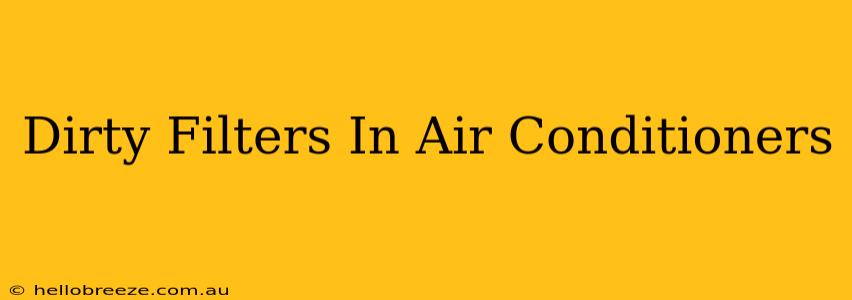Dirty air conditioner filters are a common problem, but they can lead to serious issues if left unaddressed. This comprehensive guide will explain why clean filters are crucial, how to identify dirty ones, and how to clean or replace them effectively. Let's dive in and learn how to keep your AC running smoothly and your air clean!
Why Clean Air Conditioner Filters Matter
Your air conditioner's filter is its first line of defense against dust, pollen, pet dander, and other airborne particles. A clogged filter restricts airflow, impacting your AC's performance and potentially causing costly repairs. Here's why keeping your filters clean is vital:
- Improved Efficiency: A clean filter allows for optimal airflow, enabling your AC to cool your home more efficiently. This translates to lower energy bills and a smaller carbon footprint.
- Longer Lifespan: Reduced strain on your AC unit due to unrestricted airflow prolongs its lifespan, saving you money on costly replacements.
- Better Air Quality: A clean filter removes allergens and pollutants, contributing to a healthier indoor environment, especially beneficial for those with allergies or respiratory issues.
- Preventing Breakdowns: A severely clogged filter can force your AC to work harder, leading to overheating and potential breakdowns. Regular cleaning prevents these costly repairs.
- Reduced Noise: Restricted airflow can cause your AC unit to work harder and become noisier.
Identifying Dirty Air Conditioner Filters
Knowing when to change or clean your filter is key. Here are some telltale signs of a dirty filter:
- Visible Dirt and Dust: The most obvious sign is a visibly dirty filter, covered in dust, debris, or other particles.
- Reduced Airflow: If you notice weaker airflow from your vents, a clogged filter might be the culprit.
- Increased Energy Bills: A dirty filter forces your AC to work harder, resulting in higher energy consumption and increased utility bills.
- Unusual Noises: Strange noises emanating from your AC unit could indicate restricted airflow due to a dirty filter.
- Check the Filter's Condition: Regularly inspect the filter; manufacturers often recommend filter change frequencies based on usage and conditions.
Cleaning or Replacing Your Air Conditioner Filter
The cleaning method depends on your filter type.
Disposable Filters: These are usually inexpensive and readily available. When dirty, simply replace them with a new one. Remember to always turn off the AC unit before handling the filter.
Washable Filters: Some filters are washable and reusable. Follow these steps:
- Turn off the AC unit and carefully remove the filter.
- Gently vacuum both sides of the filter to remove loose debris. Use a brush attachment for best results.
- Wash the filter with lukewarm water and mild detergent. Avoid harsh chemicals.
- Rinse thoroughly and allow the filter to air dry completely before reinstalling. Never put a wet filter back in the unit.
Important Note: Always check your AC unit's manual for specific instructions on filter cleaning and replacement.
Maintaining Clean Filters: A Proactive Approach
Regular filter maintenance is key to optimal AC performance and a healthy home environment. Consider this schedule:
- Monthly Check: Inspect your filter at least once a month.
- Cleaning/Replacement Frequency: Replace disposable filters every 1-3 months, or as recommended by the manufacturer. Wash washable filters every 2-4 weeks, depending on usage and conditions.
Following these simple steps will keep your air conditioner running efficiently, improve your indoor air quality, and save you money in the long run. Don't let dirty filters compromise your comfort and the health of your family!

